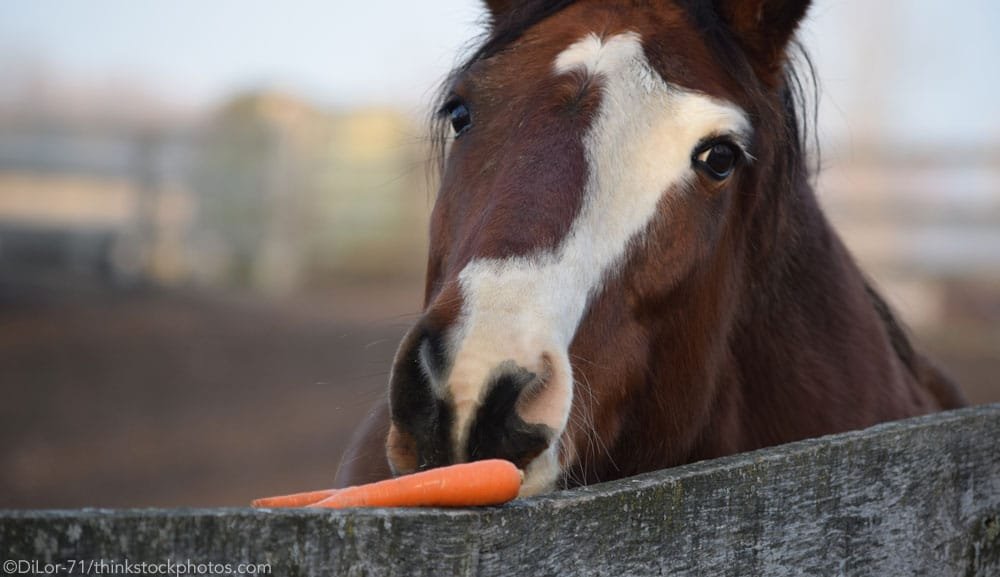horses can eat fruits and vegetables, but there are important guidelines to follow to ensure they remain safe and healthy.
Horses are herbivores, which means their diet primarily consists of grass, hay, and some grains. However, fruits and vegetables can make a tasty and nutritious treat for your horse when offered in moderation. Here’s what you need to know:
Fruits Horses Can Eat
Fruits are a great source of vitamins, minerals, and hydration for your horse, but they should only be offered as occasional treats. Here are some common fruits that horses can safely enjoy:
1. Apples
Apples are one of the most popular fruits for horses. They’re packed with fiber, vitamin C, and antioxidants. However, be sure to remove the seeds before offering them, as apple seeds contain cyanide, which is toxic in large amounts.
- Tip: Slice apples into manageable pieces to prevent choking.
2. Carrots
Carrots are a favorite treat for many horses. They are rich in beta-carotene (a source of vitamin A) and fiber. Carrots are low in sugar and are a healthy, crunchy snack.
- Tip: Offer whole carrots or chop them into smaller pieces to make it easier for your horse to eat.
3. Bananas
Bananas are safe for horses and provide a good source of potassium, which helps with muscle function and electrolyte balance. They are also a great option for horses that need extra energy.
- Tip: Peel the banana before feeding it to your horse, as the peel can be difficult to digest.
4. Pineapple
Pineapple is another safe fruit for horses and is rich in vitamin C, fiber, and antioxidants. Horses generally love the sweet, tropical flavor. Just be sure to remove the tough skin and the core.
- Tip: Offer small chunks of pineapple to make it easier for your horse to enjoy.
5. Pears
Pears are high in water content, making them a hydrating treat. They are also a good source of fiber and vitamin C. As with apples, be sure to remove the seeds before feeding.
- Tip: Slice pears into bite-sized pieces for easy consumption.
Vegetables Horses Can Eat
Horses can also enjoy a variety of vegetables, which are generally low in sugar and high in fiber. Here are some vegetables that are safe for horses:
1. Carrots
As mentioned above, carrots are both a fruit and a vegetable. They are widely loved by horses and provide plenty of nutrients. You can offer carrots as both a fruit and a vegetable in your horse’s diet.
2. Pumpkin
Pumpkin is not only a healthy treat but also a fun seasonal option for your horse. It’s packed with fiber, vitamin A, and antioxidants. Horses can eat both raw or cooked pumpkin, but it’s important to remove the seeds before feeding.
- Tip: Feed small portions and cut the pumpkin into manageable pieces.
3. Spinach
Spinach is a leafy green vegetable that can be fed to horses in small amounts. It is rich in iron, vitamins A and K, and fiber. However, it’s best to offer spinach occasionally due to its high oxalate content, which can interfere with calcium absorption in large amounts.
- Tip: Offer spinach as an occasional snack to avoid overfeeding.
4. Celery
Celery is safe for horses and can be a great crunchy treat. It’s low in calories, rich in fiber, and offers a refreshing hydrating snack.
- Tip: Cut celery into small sticks to make it easier for your horse to eat.
5. Sweet Potatoes
Sweet potatoes are packed with fiber, vitamin A, and potassium, making them a nutritious treat for your horse. Ensure they are cooked and served in moderation.
- Tip: Feed small portions of sweet potatoes, as they are high in sugar.
Fruits and Vegetables Horses Should Avoid
Not all fruits and vegetables are safe for horses. Some can cause digestive issues, toxicity, or other health problems. Here are a few fruits and vegetables to avoid:
- Grapes: Grapes are toxic to horses and can cause kidney failure.
- Tomatoes: Tomatoes (especially green ones) belong to the nightshade family and can cause digestive upset and toxicity.
- Onions and Garlic: These can cause anemia in horses if consumed in large amounts.
- Avocado: Avocado contains persin, which is toxic to horses and can lead to respiratory and heart issues.
- Rhubarb: Rhubarb leaves are toxic to horses and can cause severe kidney problems.
Always research any fruit or vegetable before offering it to your horse, and consult a veterinarian if you’re unsure about its safety.
Guidelines for Feeding Fruits and Vegetables to Horses
- Feed in Moderation: Fruits and vegetables should be considered a treat and fed in moderation, not as a replacement for hay or grain. Overfeeding can cause digestive upset or lead to excessive sugar intake.
- Remove Seeds and Pits: Always remove any seeds or pits, as they can be toxic or pose a choking hazard.
- Introduce Gradually: When introducing a new fruit or vegetable, start with small portions to ensure your horse can tolerate it.
- Clean and Wash: Always wash fruits and vegetables thoroughly to remove pesticides, dirt, or chemicals before feeding them to your horse.
- Monitor for Reactions: Some horses may have allergies or sensitivities to certain fruits or vegetables. Watch for signs of digestive upset or allergic reactions and discontinue feeding if any issues arise.




